![]() Story featured on the location-based travel app HearHere. Download free on the App Store for iPhone
Story featured on the location-based travel app HearHere. Download free on the App Store for iPhone
—
Jump to – Rip Van Winkle children's book poem by George P. Webster
By Charles M. Skinner in 1896
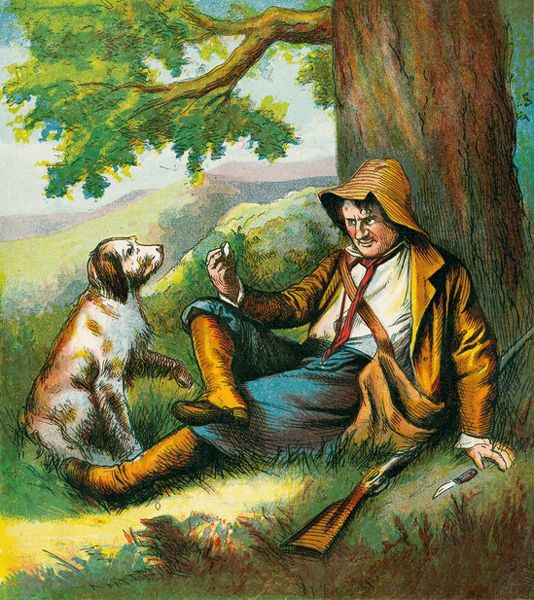
Rip Van Winkle and his dog by Thomas Nast, 1880
The story of Rip Van Winkle, told by Irving, dramatized by Boucicault, acted by Jefferson, pictured by Darley, set to music by Bristow, is one of the best known of American legends. Rip was a real personage, and the Van Winkles were a considerable family in their day. An idle, good-natured, happy-go-lucky fellow, he lived, presumably, in the village of Catskill, New York and began his long sleep in 1769. His wife was a shrew, and to escape her abuse Rip often took his dog and gun and roamed away to the Catskills, nine miles westward, where he lounged or hunted, as the humor seized him. It was on a September evening, during a jaunt on South Mountain, that he met a stubby, silent man, of goodly girth, his round head topped with a steeple hat, the skirts of his belted coat and flaps of his petticoat trousers meeting at the tops of heavy boots, and the face—ugh!—green and ghastly, with unmoving eyes that glimmered in the twilight like phosphorus. The dwarf carried a keg, and on receiving an intimation, in a sign, that he would like Rip to relieve him of it, that cheerful vagabond shouldered it and marched on up the mountain.
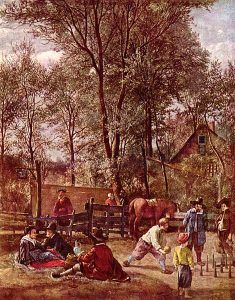
Playing Bowls
At nightfall they emerged on a little plateau where a score of men in the garb of long ago, with faces like that of Rip's guide, and equally still and speechless, were playing bowls with great solemnity, the balls sometimes rolling over the plateau's edge and rumbling down the rocks with a boom like thunder. A cloaked and snowy-bearded figure, watching aloof, turned like the others, and gazed uncomfortably at the visitor who now came blundering in among them. Rip was at first for making off, but the sinister glare in the circle of eyes took the run out of his legs, and he was not displeased when they signed to him to tap the keg and join in a draught of the ripest schnapps that ever he had tasted,—and he knew the flavor of every brand in Catskill. While these strange men grew no more genial with passing of the flagons, Rip was pervaded by a satisfying glow; then, overcome by sleepiness and resting his head on a stone, he stretched his tired legs out and fell to dreaming.
Morning. Sunlight and leaf shadow were dappled over the earth when he awoke, and rising stiffly from his bed, with compunctions in his bones, he reached for his gun. The already venerable implement was so far gone with rot and rust that it fell to pieces in his hand, and looking down at the fragments of it, he saw that his clothes were dropping from his body in rags and mold, while a white beard flowed over his breast. Puzzled and alarmed, shaking his head ruefully as he recalled the carouse of the silent, he hobbled down the mountain as fast as he might for the grip of the rheumatism on his knees and elbows, and entered his native village. What! Was this Catskill? Was this the place that he left yesterday? Had all these houses sprung up overnight, and these streets been pushed across the meadows in a day? The people, too: where were his friends? The children who had romped with him, the rotund topers whom he had left cooling their hot noses in pewter pots at the tavern door, the dogs that used to bark a welcome, recognizing in him a kindred spirit of vagrancy: where were they?
And his wife, whose athletic arm and agile tongue had half disposed him to linger in the mountains how happened it that she was not awaiting him at the gate? But gate there was none in the familiar place: an unfenced yard of weeds and ruined foundation wall were there. Rip's home was gone. The idlers jeered at his bent, lean form, his snarl of beard and hair, his disreputable dress, his look of grieved astonishment. He stopped, instinctively, at the tavern, for he knew that place in spite of its new sign: an officer in blue regimentals and a cocked hat replacing the crimson George III of his recollection, and labeled "General Washington." There was a quick gathering of ne'er-do-wells, of tavern-haunters and gaping 'prentices, about him, and though their faces were strange and their manners rude, he made bold to ask if they knew such and such of his friends.
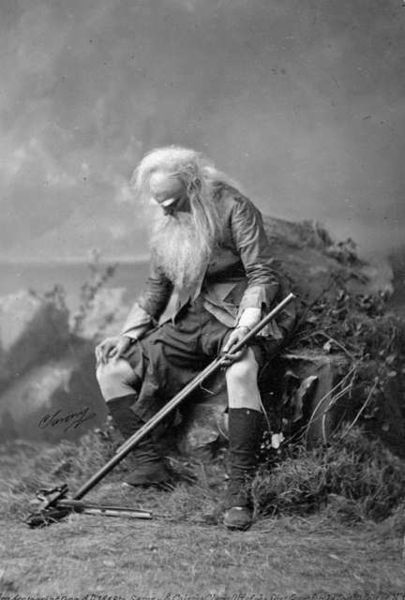
Joseph Jefferson played Rip Van Winkle in theatrical productions and short films in the late 1890's.
"Nick Vedder? He's dead and gone these eighteen years." "Brom Dutcher? He joined the army and was killed at Stony Point." "Van Brummel? He, too, went to the war, and is in Congress now."
"And Rip Van Winkle?"
"Yes, he's here. That's him yonder."
And to Rip's utter confusion he saw before him a counterpart of himself, as young, lazy, ragged, and easy-natured as he remembered himself to be, yesterday—or, was it yesterday?
"That's young Rip," continued his informer. "His father was Rip Van Winkle, too, but he went to the mountains twenty years ago and never came back. He probably fell over a cliff, or was carried off by Indians, or eaten by bears."
Twenty years ago! Truly, it was so. Rip had slept for twenty years without awaking. He had left a peaceful colonial village; he returned to a bustling republican town. How he eventually found, among the oldest inhabitants, some who admitted that they knew him; how he found a comfortable home with his married daughter and the son who took after him so kindly; how he recovered from the effect of the tidings that his wife had died of apoplexy, in a quarrel; how he resumed his seat at the tavern tap and smoked long pipes and told long yarns for the rest of his days, were matters of record up to the beginning of this century.
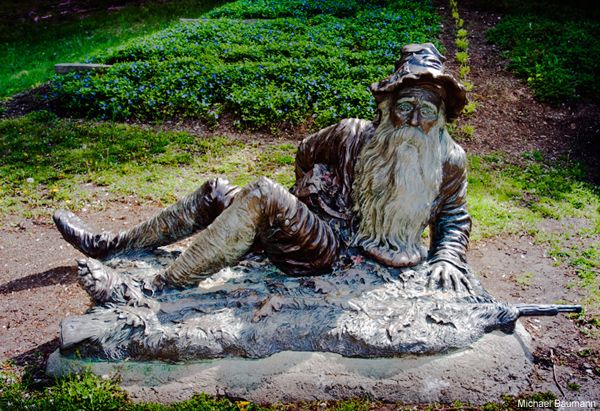
Statue of Rip van Winkle in Irvington, New York, not far from "Sunnyside", the home of Washington Irving, photo courtesy The Rivertowns, New York.
And a strange story Rip had to tell, for he had served as cup-bearer to the dead crew of the Half Moon. He had quaffed a cup of Hollands with no other than Henry Hudson himself. Some say that Hudson's spirit has made its home amid these hills, that it may look into the lovely valley that he discovered; but, others hold that every twenty years he and his men assemble for a revel in the mountains that so charmed them when first seen swelling against the western heavens, and the liquor they drink on this night has the bane of throwing any mortal who lips it into a slumber whence nothing can arouse him until the day dawns when the crew shall meet again. As you climb the east front of the mountains by the old carriage road, you pass, half-way up the height, the stone that Rip Van Winkle slept on, and may see that it is slightly hollowed by his form. The ghostly revelers are due in the Catskills in 1909, and let all tourists who are among the mountains in September of that year beware of accepting liquor from strangers.
Charles M. Skinner, 1896
"Rip Van Winkle" is a short story based on a 'fictional' character by the American author Washington Irving published in 1819. Although the story is set in New York's Catskill Mountains, Irving later admitted, "When I wrote the story, I had never been on the Catskills."
Irving's tale spawned theatrical productions, songs, children's books, short films, and this tale by Charles M. Skinner written in 1896.
About the Author: Charles M. Skinner (1852-1907) authored the complete nine-volume set of Myths and Legends of Our Own Land in 1896. This tale is excerpted from these excellent works, though it is no verbatim, as it has been edited for the modern reader.
Poem By George P. Webster, 1880

Near to the town, in a cottage small,
Lived Rip Van Winkle, known to all
As a harmless, drinking, shiftless lout,
Who never would work, but roamed about,
Always ready with jest and song-
Idling, tippling all day long.
"Shame on you, Rip!" cried the scolding Vrow;
And old men muttered and knit their brows.
Not so with the boys, for they would shout,
And follow their hero, Rip, about,
Early or late–it was all the same,
They gave him a place in every game.
At ball he was ready to throw or catch;
At marbles, too, he was quite their match;
And many an urchin's face grew bright,
When Rip took hold of his twine and Kite.
And so he frittered the time away–
"Good natured enough," they all would say.
But the village parson heaved a sigh
As Rip, in his cups, went reeling by,
With a silly and a drunken leer–
His good dog Schneider always near.
Rip was fond of his rod and line,
And many a time, when the day was fine,
He would wander out to some neighb'ring stream,
And there, with his dog, would sit and dream;
Hour after hour, would he dozing wait,
And woe to the fish that touched his bait.
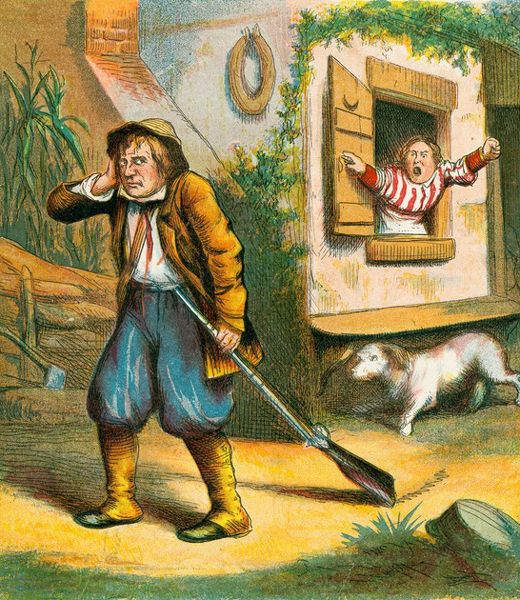
Rip Van Winkle's scolding wife by Thomas Nast.
But the stream of his life ran sometimes rough,
And his good "Vrow" gave him many a cuff,
For she was never a gentle dame,
And Rip was a toper, and much to blame.
But little did Rip Van Winkle care
For his wife or his home–he was seldom there–
But tried in his cups his cares to drown;
His scolding wife, with her threat'ning frown,
At his cottage-door he was sure to see–
"Ah! this," said Rip, "is no place for me."
So down to the tavern to drink his rum,
And waste his time with some red-nosed chum,
He was sure to go; for he knew that there
He would find a glass and a vacant chair,
And jolly fellows, who liked his fun,
And the tales he told of his dog and gun.
But his was still but a sorry life,
For, sot as he was, he loved his wife;
But he would tipple both day and night,
And she would scold him with all her might
Thus Rip Van Winkle had many a grief,
And up 'mongst the mountains sought relief.
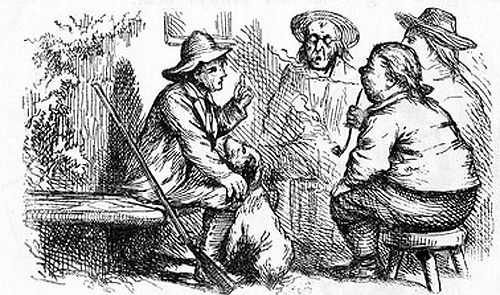
For lowering clouds or a burning sun
He cared but little; his dog and gun
Were his friends, he knew; while they were near
He roamed the forests, and felt no fear.
If tired at last, and a seat he took,
And his dog came up with a hungry look,
He had always a crust or bone to spare,
And Schneider was certain to get his share.
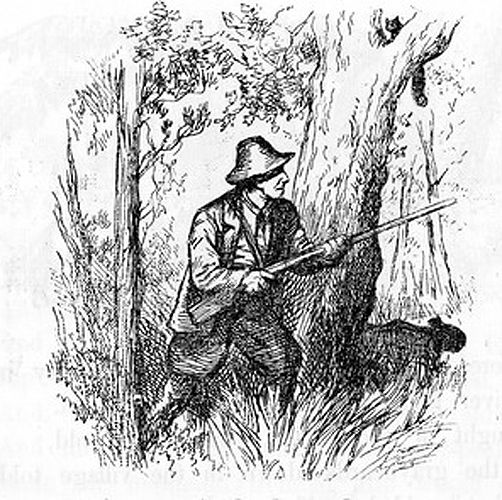
And then if a squirrel chanced to stray
In range of his gun, he would blaze away,
And he held it too with a steady aim–
Rip never was known to miss his game.
But over his ills he would sometimes brood,
And scale the peaks in a gloomy mood;
And once he had climbed to a dizzy height,
When the sun went down, and the shades of night
Came up from the vale, and the pine-trees tall,
And the old gray rocks, and the waterfall
Grew dusky and dim, and faded away,
Till night, like a pall, on the mountain lay.
Full many a mile he had strayed that day,
And up in the mountains had lost his way;
And there he must stay through the gloomy night,
And shiver and wait for the morning light.
He thought of the stories, strange and old,
Which the graybeards down in the village told;
"And what," said he, "if the tale were true
I have heard so oft of a phantom crew,
Who up in the Catskills, all night long,
Frolic and revel with wine and song."
Just then a voice from a neighb'ring hill
Cried, "Rip Van Winkle!" and all was still
Then he looked above and he looked below,
And saw not a thing but a lonely crow.
"Ho, Rip Van Winkle!" the voice still cried,
And Schneider skulked to his master's side.

Just then from a thicket a man came out–
His legs were short and his body stout,
He looked like a Dutchman in days of yore,
With buttons behind and buttons before;
And held a keg with an iron grip,
And beckoned for help to the gazing Rip.
Rip had his fears, but at last complied,
And bore the keg up the mountain side;
And now and then, when a thunder-peal
Made the mountain tremble, Rip would steal.
A look at his guide, but never a word
From the lips of the queer old man was heard.
Up, up they clambered, until, at last,
The stranger halted. Rip quickly cast
A glance around, and as strange a crew
As ever a mortal man did view.
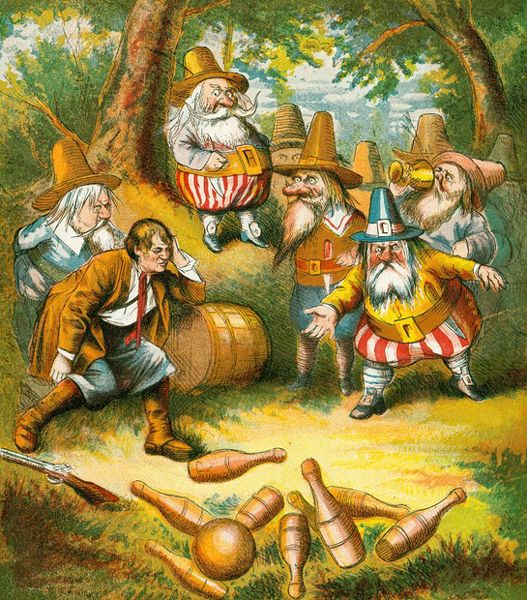
Were playing at nine-pins; at every ball
'Twas fun to see how the pins would fall;
And they rolled and rolled, without speaking a word,
And this was the thunder Rip had heard.
Their hats looked odd, each with sugar-loaf crown,
And their eyes were small, and their beards hung down,
While their high-heeled shoes all had peaked toes,
And their legs were covered with blood-red hose;
Their noses were long, like a porker's snout,
And they nodded and winked as they moved about
They tapped the keg, and the liquor flowed,
And up to the brim of each flagon glowed;
And a queer old man made a sign to Rip,
As much as to say, "Will you take a nip?"
Nor did he linger or stop to think,
For Rip was thirsty and wanted a drink.
"I'll risk it," thought he; "it can be no sin;
And it smells like the best of Holland gin;"
So he tipped his cup to a grim old chap,
And drained it; then, for a quiet nap,
He stretched himself on the mossy ground,
And soon was wrapped in a sleep profound.
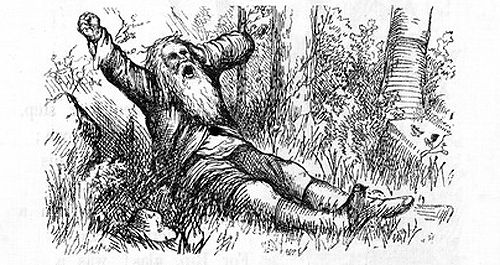
At last he woke; 'twas a sunny morn,
And the strange old man of the glen was gone:
He saw the young birds flutter and hop,
And an eagle wheeled round the mountain-top;
Then he rubbed his eyes for another sight–
"Surely," said he, "I have slept all night."
"I thought of the flagon and nine-pin game;
"Oh! what shall I say to my fiery dame!"
He, faintly faltered; "I know that she
Has a fearful lecture in store for me."
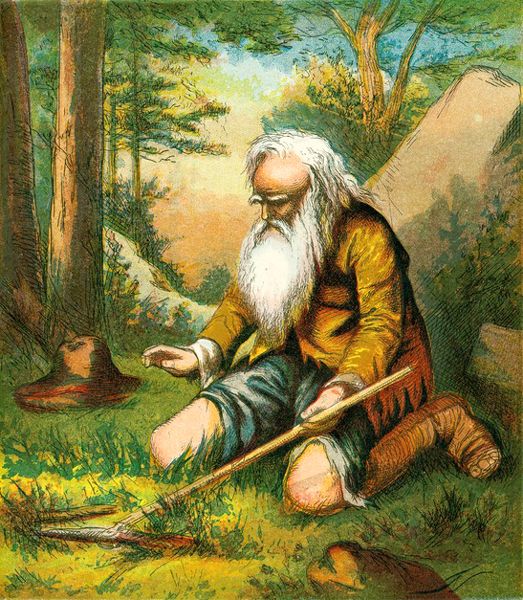
He took up his gun, and strange to say,
The wood had rotted and worn away:
He raised to his feet, and his joints were sore;
"Said he, "I must go to my home once more."
Then, with trembling step, he wandered down,
Amazed, he entered his native town.
The people looked with a wondering stare,
For Rip, alas! was a stranger there;
He tottered up to his cottage-door,
But his wife was dead, and could scold no more;
And down at the tavern he sought in vain
For the chums he would never meet again;
He looked, as he passed, at a group of girls
For the laughing eye and the flaxen curls
Of the child he loved as he loved his life,
But she was a thrifty farmer's wife;
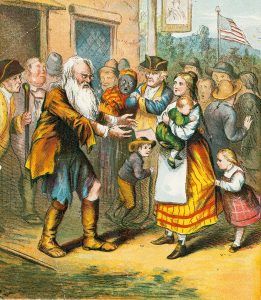
And when they met, and her hand he took,
She blushed and gave him a puzzled look;
But she knew her father and kissed his brow,
All covered with marks and wrinkles now;
For Rip Van Winkle was old and gray,
And twenty summers had passed away–
Yes, twenty winters of snow and frost
Had he in his mountain slumber lost;
Yet his love for stories was all the same,
And he often told of the nine-pin game.
But the age was getting a little fast–
The Revolution had come and passed,
And Young America, gathered about,
Received his tales with many a doubt,
Awhile he hobbled about the town;
Then, worn and weary, at last laid down,
For his locks were white and his limbs were sore–
And Rip Van Winkle will wake no more.
George P. Webster, 1880
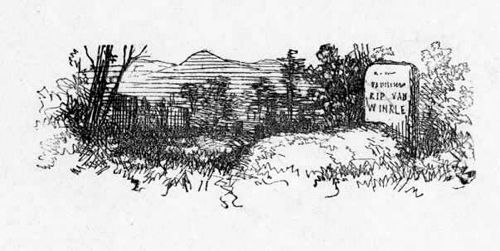
Compiled by Kathy Weiser/Legends of America, updated January 2020.
About the Author: The above poem by George P. Webster, an American author, was turned into a children's book published by McLoughlin Bros., Inc. in 1880. Webster also later wrote and published the popular children's book, Santa Claus and His Works in 1889. Both books were illustrated by the famous artist Thomas Nast.
Also See:
Paul Bunyan – Hero Lumberjack
Pecos Bill – A Legend of Frontier Spirit
Folklore & Superstition in America
Posted by: tabathabusbye0197867.blogspot.com
Source: https://www.legendsofamerica.com/ny-ripvanwinkle/

0 Comments